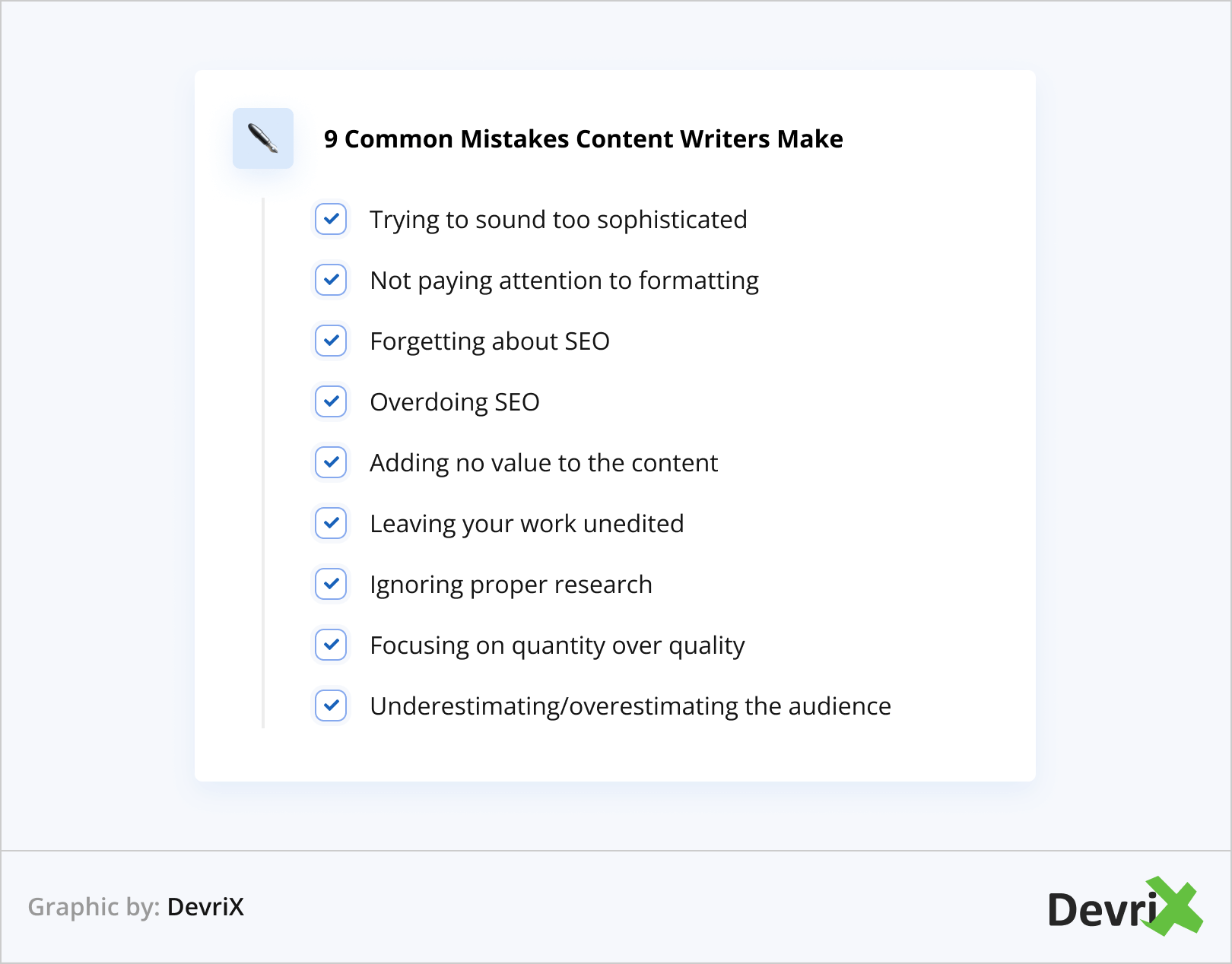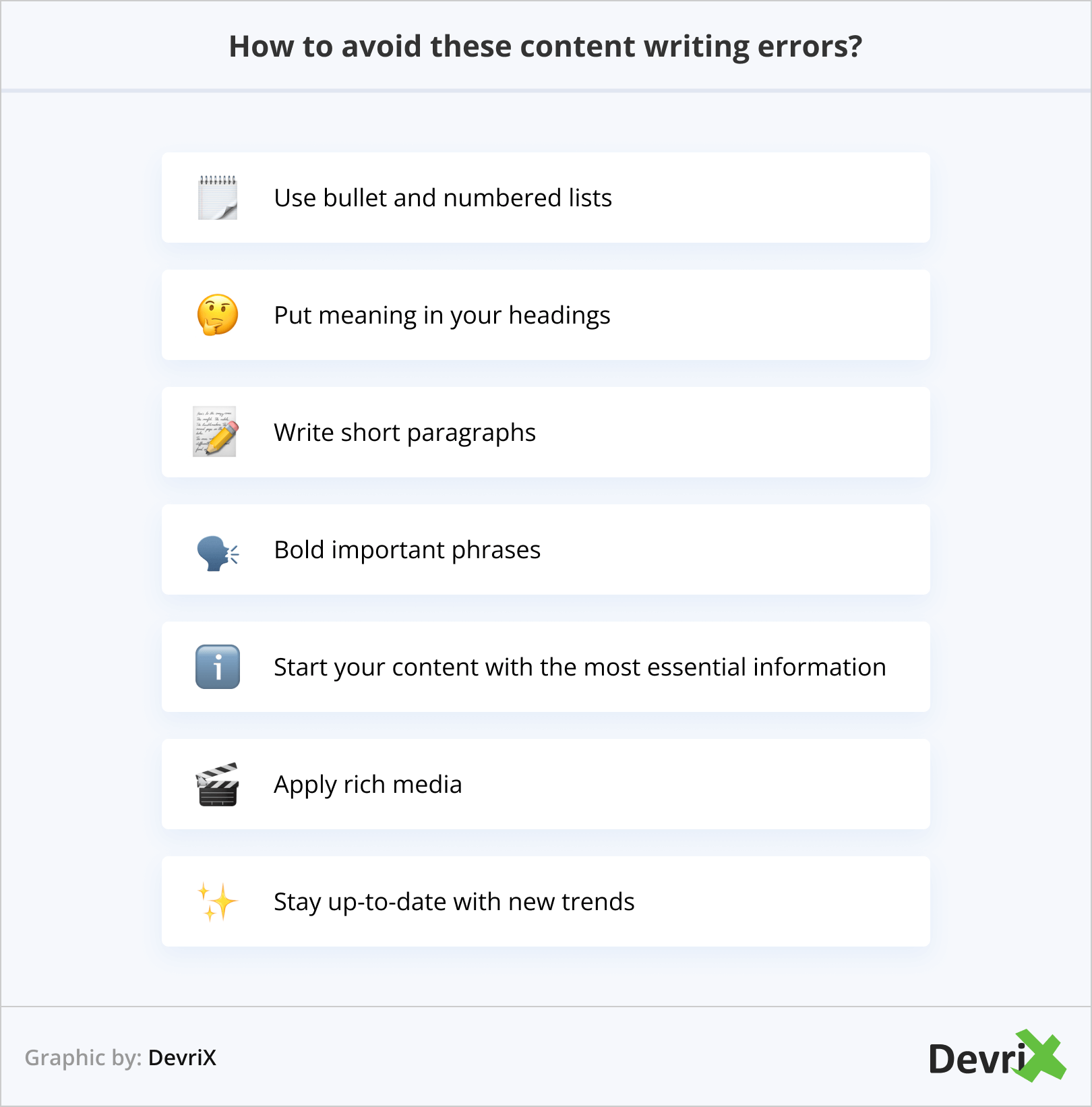Content might be king, but writing is not an easy task. Whether you’re a freelance writer, or a senior content writer, there are a lot of aspects of writing you should be paying attention to.
From proper formatting to the relevant use of keywords, keeping your text fun and engaging, and trying to be original… writing is hard, whoever says the opposite has clearly not written anything in their life.
With all that being said, there are some common mistakes content writers make that can easily be avoided with practice and mindfulness.
But enough small talk, let’s get started!
9 Common Mistakes Content Writers Make

- Trying to sound too sophisticated.
- Not paying attention to formatting.
- Forgetting about SEO.
- Overdoing SEO.
- Adding no value to the content.
- Leaving your work unedited.
- Ignoring proper research.
- Focusing on quantity over quality.
- Underestimating/overestimating the audience.
1. Trying to Sound Too Sophisticated
You should never forget that in 9/10 cases, you’ll be writing for the general public. The average person’s reading level is around 7th or 8th grade. One of the most common mistakes content writers make is using phrases that are way too complex for most of their audience.
Instead of thinking about how sophisticated and smart you’re going to be by using complicated words, think about the readers you could lose, because they won’t be able to understand you.
This doesn’t necessarily mean you have to “dumb down” your writing, just try to include words that are used in everyday speech, and are used often, in general. When you’re talking to a friend, would you say that someone is “debonair”, or would you use the word “carefree”?
Take a moment to consider everything. How often do you suppose the average person would Google a word they don’t understand in your article? Chances are, if they feel too lost or overwhelmed by your style, they’ll prefer another website.
2. Not Paying Attention to Formatting
Are you aware that just 16% of people read word by word? Doesn’t matter if it’s an email, an article, or some other piece of content. Most people also skim read, therefore the only way to grab their attention is to apply nice, readable formatting of your text.
Think about your own experience – when was the last time you read an online article from start to finish? In case you have done so recently, please send us the article in the comments section, it must have been superb. 😛
So, what can you do to avoid these content writing errors? Here are some tips:

- Use bullet and numbered lists. (They can also help you rank for featured snippets)
- Put meaning in your headings. (People don’t have time to waste)
- Write short paragraphs. (They are easier to digest)
- Bold important phrases. (To grab attention, of course)
- Start your content with the most essential information. (Inverted pyramid style)
- Apply rich media – images, video, GIFs, audio. (More fun and better engagement)
- Stay up-to-date with new trends. (Memes are a thing, yes)
3. Forgetting About SEO
Nowadays, you can’t be a content writer and be ignorant about SEO. Content writing and search engine optimization go hand by hand, and there is nothing you can do, except to adapt and evolve.
In fact, you might have written the most revolutionary article that could change the world as we know it, only to then realize you are ranking on page 9, and no one will ever read that article.
You might be wondering: what can I do to avoid these content writing mistakes? It’s simple. Just follow the SEO best practices, when it comes to writing. In a nutshell:
- Conduct proper keyword research.
- Place both internal and external links.
- Write short paragraphs and apply the proper formatting.
- Structure your headers (H2→H3).
- Use images.
4. Overdoing SEO
Balance is the key. While you need to optimize your text for search engines, be cautious not to overdo it, which might have the opposite effect. For example, stuffing keywords for the sake of it, will not help you rank higher, on the contrary, you risk getting penalized by Google.
Other bad SEO practices, also known as black hat SEO, include cloaking, using private link networks, hidden redirects, and link manipulation.
However, even without intentionally applying these practices, you could still be over optimizing your content. Here are some signs you are overdoing SEO:
- Placing too many links. A general rule of thumb for many years has been that no page should have more than 100 links. Of course, this doesn’t mean you should aim for 99 links on all pages.
It’s recommended that you place no more than 1-2 links per 500 words. In reality, think about how anchor texts logically follow the context, and how useful it would be to for a reader. Naturally, as it is with SEO, everything varies, but an average article of 2,000 words is okay with 7-8 external links, and 5-6 internal ones. - Stuffing the main keyword. You’ve done your keyword research, and you’ve found the perfect main keyword to optimize your text. Great job!
Still, after you’ve used that exact word or phrase for the 36th time, it might be time to go through your text and add some synonyms. After all, it’s not natural to repeat the same phrase over and over just to please the crawl bots. You won’t, and you will also repel human visitors. Overall, it’s nice to use your main keyword 4-5 times across your text, and include other keywords, related phrases, and LSI keywords. - Writing duplicate content. This one might not be entirely up to the writer, as oftentimes, there’s another person in charge of the editorial calendar and SEO. However, in case you’ve noticed that the article you’ve just written or are about to write, is too similar to another one you already have on your website, it’s best to stop and discuss it with whoever is in charge of content. You see, duplicate content might lead to indexing issues, lower visibility in SERPs, and a lot of other headaches.
5. Adding No Value to the Content
What would you say is the main goal of content writing? If you said, to educate the reader and present a solution to specific problems, you’d be correct.
Does your content accomplish any of these? If you’re writing just for the sake of it, and basically repeating what everyone else has already written…what’s the point?
Sure, you’ve done your job, and you will get paid, but there must be more than that. You didn’t become a writer to rephrase and spam low-quality material, right?

6. Leaving Your Work Unedited
One of the most common mistakes in content writing is to leave your draft unedited, and think you’ve finished your job. Most organizations have an editor, or proofreader, but even if you don’t have such a luxury, the least you can do is to check your own text for typos, discrepancies, and technical errors.
Not editing your article is like cooking a delicious meal without adding seasoning. It’s still good, but the flavor is not the same. Don’t be satisfied with mediocrity, aim for perfection.
7. Ignoring Proper Research
Sometimes you’ll be writing about topics you understand, and are interested in. Other times, you will have to delve deeper into a subject you’re not familiar with at all. However, in all cases, one thing is for sure: proper research is essential to good writing.
Naturally, some writers need less time to understand a topic, while others need more time to dig thoroughly into the same subject. Of course, some companies are heavily focused on content, and you don’t always have the opportunity to properly research it.
Still, before you start writing, make sure you understand, at least, the basics. Writing an outline also helps a lot, and spares you from wondering if you’ve missed anything important about the topic.
Here’s a quick tip for when you’re researching a topic you’re not familiar with, but also don’t have too much time to spend on it.
Don’t try to understand everything in detail. If you just need to write a “how to” or “what is” type of article, think about how you would explain it to someone who has no clue about it, for example, “your grandma”.
In practice, this means leaving any unneeded information aside and focusing on covering the essentials.
8. Focusing on Quantity Over Quality
You can’t always allow yourself the luxury of putting quality over quantity. After all, the world of today is all about fast results, busy schedules, and so on. You might have to write 3-4 articles a week, and you can’t always focus on quality when you have to be fast.
Regardless of it all, your job as a content writer is to be quick, decisive, creative, and above all, deliver high quality content. It sounds a bit like juggling four balls, but remember, no one said it was going to be easy (he who hasn’t written doesn’t know).
The fact is: balance is crucial, not only in writing, but with everything else in life. If you have to compromise, do it with quantity. It’s better to have written two top-notch articles than four articles, that are subpar.
9. Underestimating/Overestimating Your Audience
Know your target audience – they are the people you are writing for. Yes, it does matter, especially if you are writing to an audience of academic teachers or digital marketers. In all cases, knowing your audience is an important factor towards getting the right tone of voice, style of writing, and even the jokes or memes you use right.
This surely is one of the most common mistakes content writers make so try your best to avoid it and tailor your content to your readership.
In Conclusion
Content is essential in all marketing endeavors, however, good content writing requires experience, knowledge, and a constant strive for perfection.
Do you know of any other common mistakes content writers make? Do share them with us in the comments section below.
![Common Mistakes Content Writers Make [How to Write Better]](https://devrix.com/wp-content/uploads/2022/09/Common-Mistakes-Content-Writers-Make-How-to-Write-Better-810x340.png)



